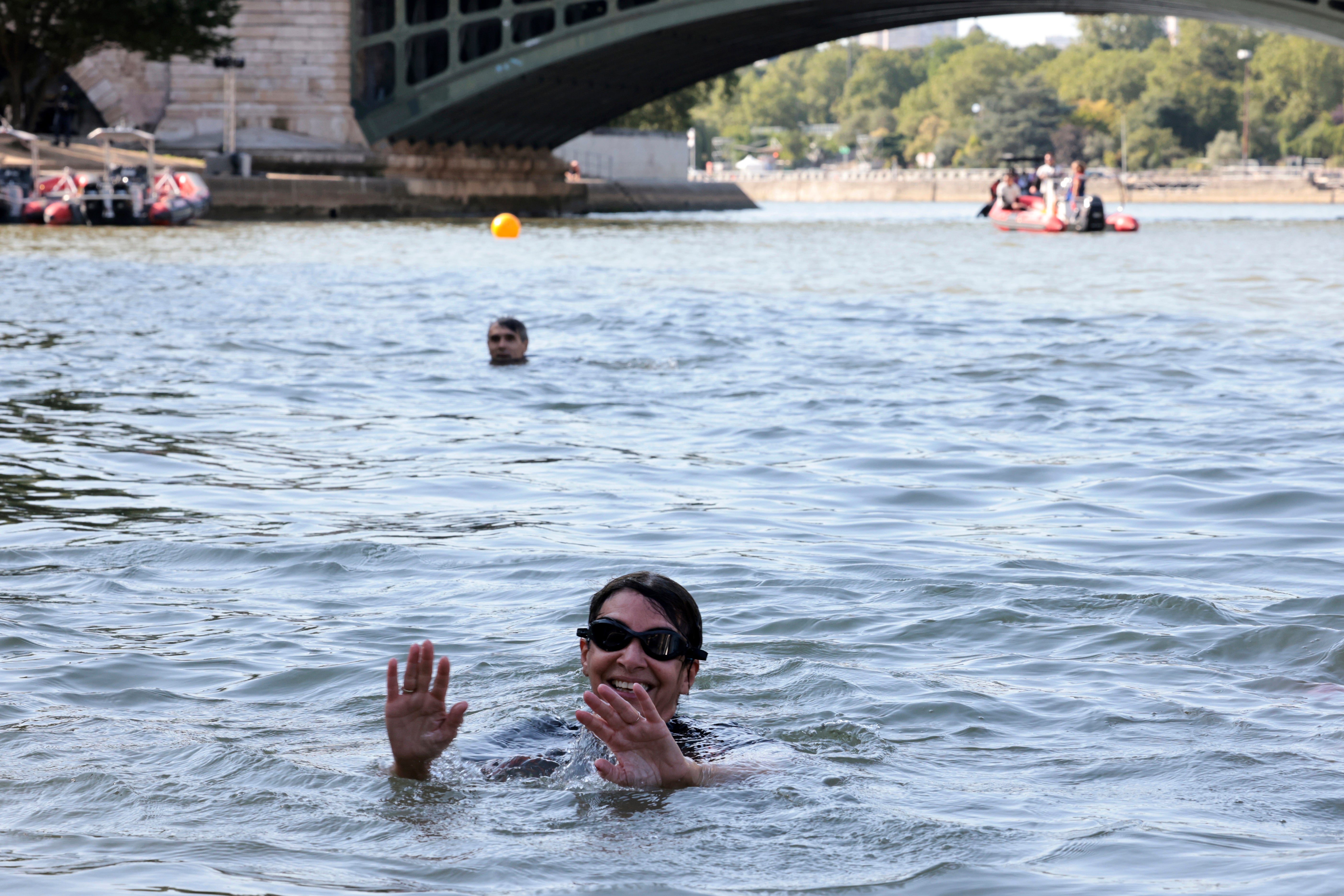This website uses cookies so that we can provide you with the best user experience possible. Cookie information is stored in your browser and performs functions such as recognising you when you return to our website and helping our team to understand which sections of the website you find most interesting and useful.
Support truly
independent journalism
Our mission is to deliver unbiased, fact-based reporting that holds power to account and exposes the truth.
Whether $5 or $50, every contribution counts.
Support us to deliver journalism without an agenda.

Louise Thomas
Editor
The mayor of Paris has taken in the River Seine in a bid to prove that the waters are clean enough to host open-swimming events during the Olympic Games – which start in less than two weeks.
Wearing a full-body wetsuit, Anne Hidalgo plunged into the river near Notre Dame cathedral alongside Paris 2024 chief Tony Estanguet and the top government official for the Paris region, Marc Guillaume.
French president Emmanuel Macron had also been planning to take a dip in the Seine. But apparently the fallout from the snap election he called last month has kept him busy.
Ms Hidalgo followed in the footsteps of French sports minister Amelie Oudea-Castera, who swam in the Seine last weekend also wearing a full-body suit.
With the opening ceremony for Paris 2024 just nine days away, and to include an athletes’ parade on boats on the Seine, the 65-year-old mayor was cheered as she swam freestyle.
“The water is very, very good. A little cool, but not so bad,” the mayor said after the dip.
The cleanliness of the river has been a controversial topic in Paris, particularly since 2015, when Olympic organisers invested around £1.2bn in attempts to filter sewage from the water. The plan included constructing a giant underground water storage basin in central Paris, renovating sewer infrastructure, and upgrading wastewater treatment plants. The storage basin is capable of holding 46,000 cubic metres of wastewater before it flows through a tunnel to a treatment plant. When the water meets the required health criteria, it is released into the Seine.

Ms Hidalgo had originally planned to swim last month, but had to delay because levels of bacteria indicating the presence of faecal matter were found to well above accepted limits. The snap parliamentary elections across France also delayed her swim. The daily water-quality tests in early June indicated unsafe levels of E. coli bacteria, though they have been followed by recent improvements.
According to the most recent, 12 July, Seine water quality bulletin, based on the Eau de Paris water analysis, the water quality would be suitable for swimming in six out of seven days at the Olympics swimming sites.
The Seine is set to be used for the swimming leg of the Olympics triathlon on 30-31 July and 5 August, as well as the open-water swimming on 8-9 August.
Decisions on whether to run Olympics events will be taken the night before, and early that same morning, with a technical committee including athletes, international federation, regional authorities and national weather service Meteo France making the call.
"The first athletes are arriving tomorrow, and so this is a very important message that, finally, the Seine is swimmable, and the triathlon and swimming events can be held here," Mr Estanguet said.

If the river is not deemed to be suitable, organisers have contingency plans: the marathon swimming event will take place at Vaires-sur-Marne, where the rowing and canoeing events are to be held, and the triathlon will be turned into a duathlon.
Competitors swam in the river during the 1900 Paris Olympics, but swimming was banned a couple of decades later. Politicians have long vowed to being it back. Jacques Chirac, the former French president, made a similar pledge about swimming in the Seine in 1988 when he was Paris mayor, but it was never realised.
Cleaning up the Seine has been promoted as one of the main legacy achievements of Paris 2024. Ms Hidalgo says she intends to create three public bathing areas for the city’s residents next year, taking advantage of the new sewage filtering systems.
But experts have cautioned that while the water quality is improving, it is still not all they could be.
“It’s been raining all over France. Summer has been very late to arrive and so have the good results,” said Marc Valmassoni from clean-water campaign group Surfrider, which has been conducting weekly tests on the Seine since last year.
“They’re not excellent, they’re not terrible, they’re average. But at this time the water is swimmable.”
Reuters contributed to this report



 Africana55 Radio
Africana55 Radio 
